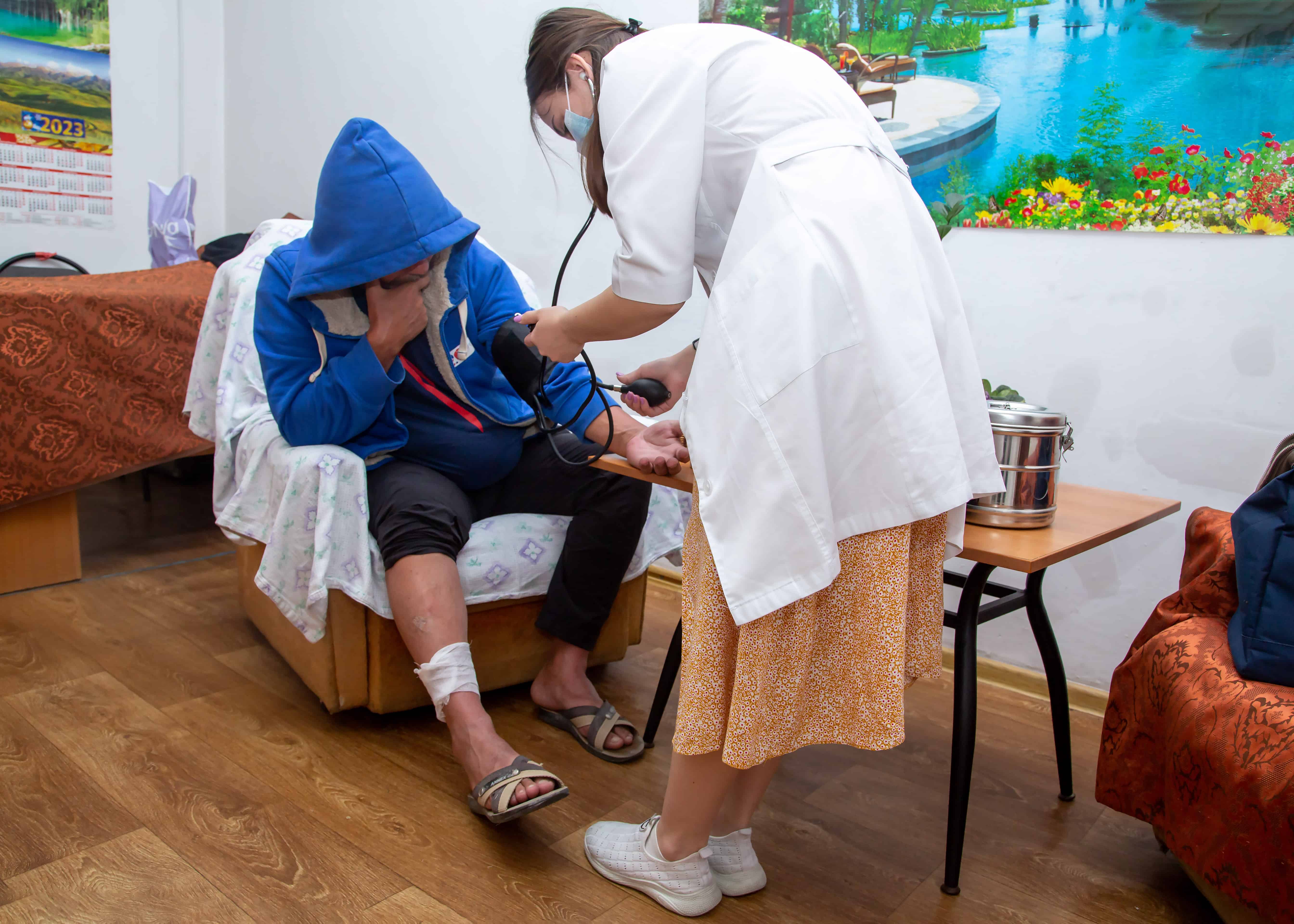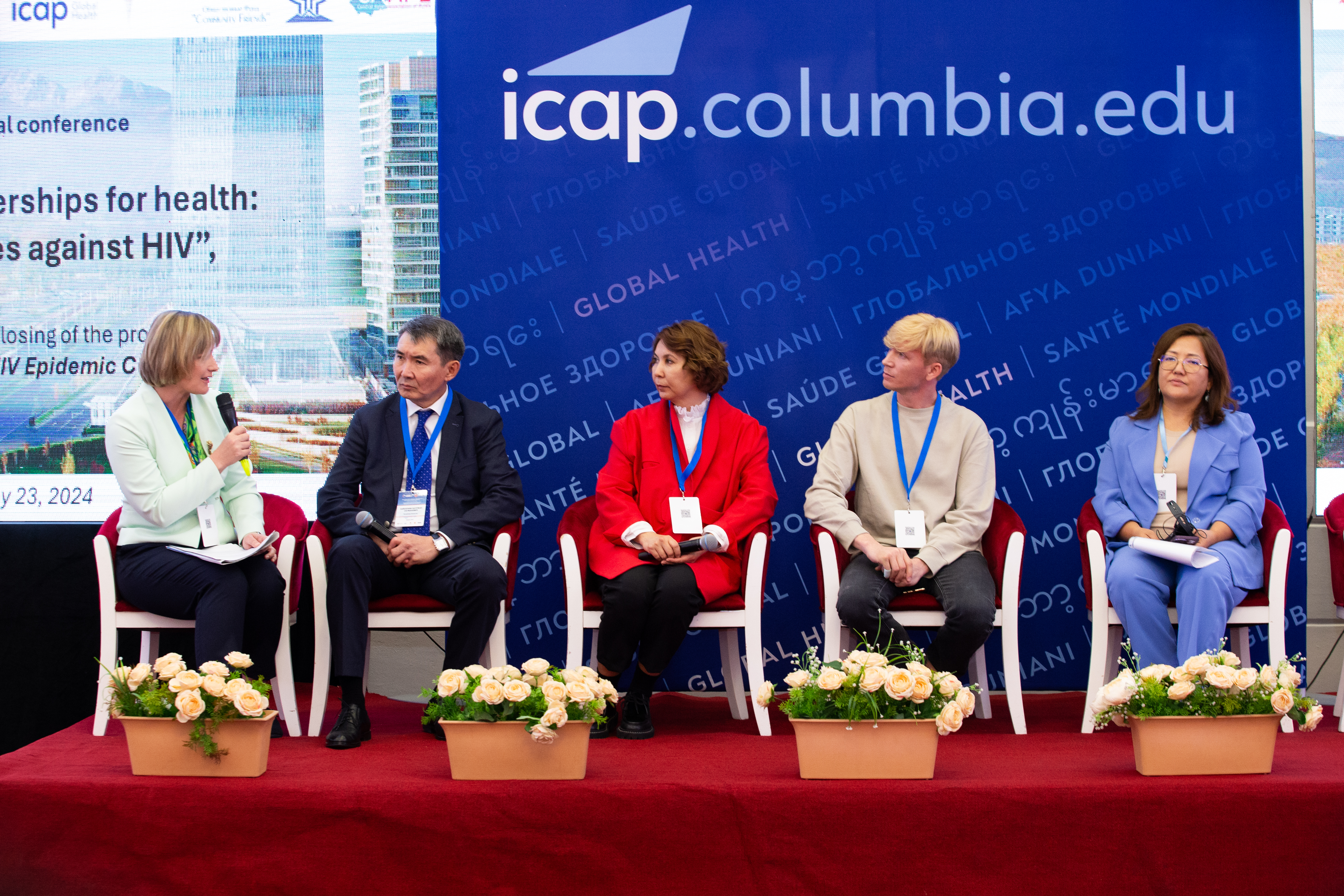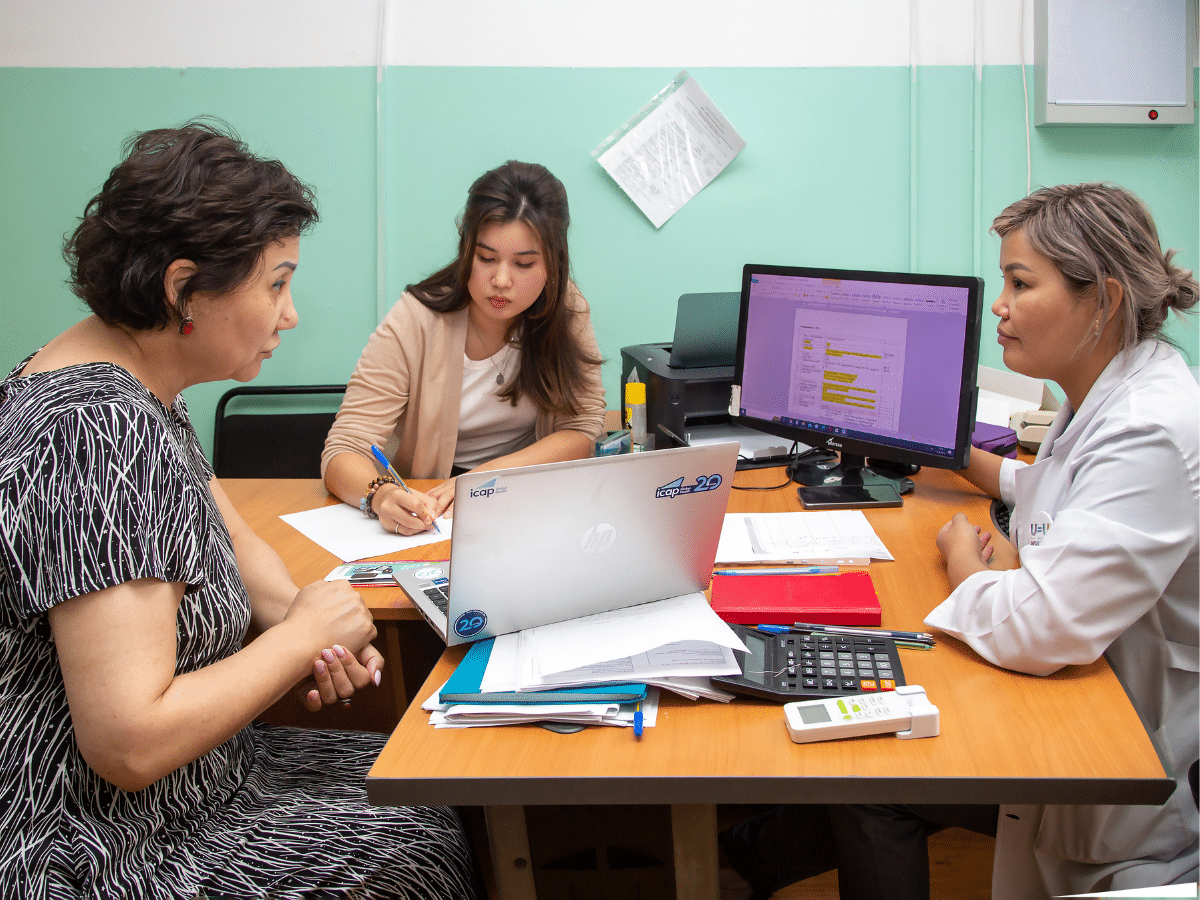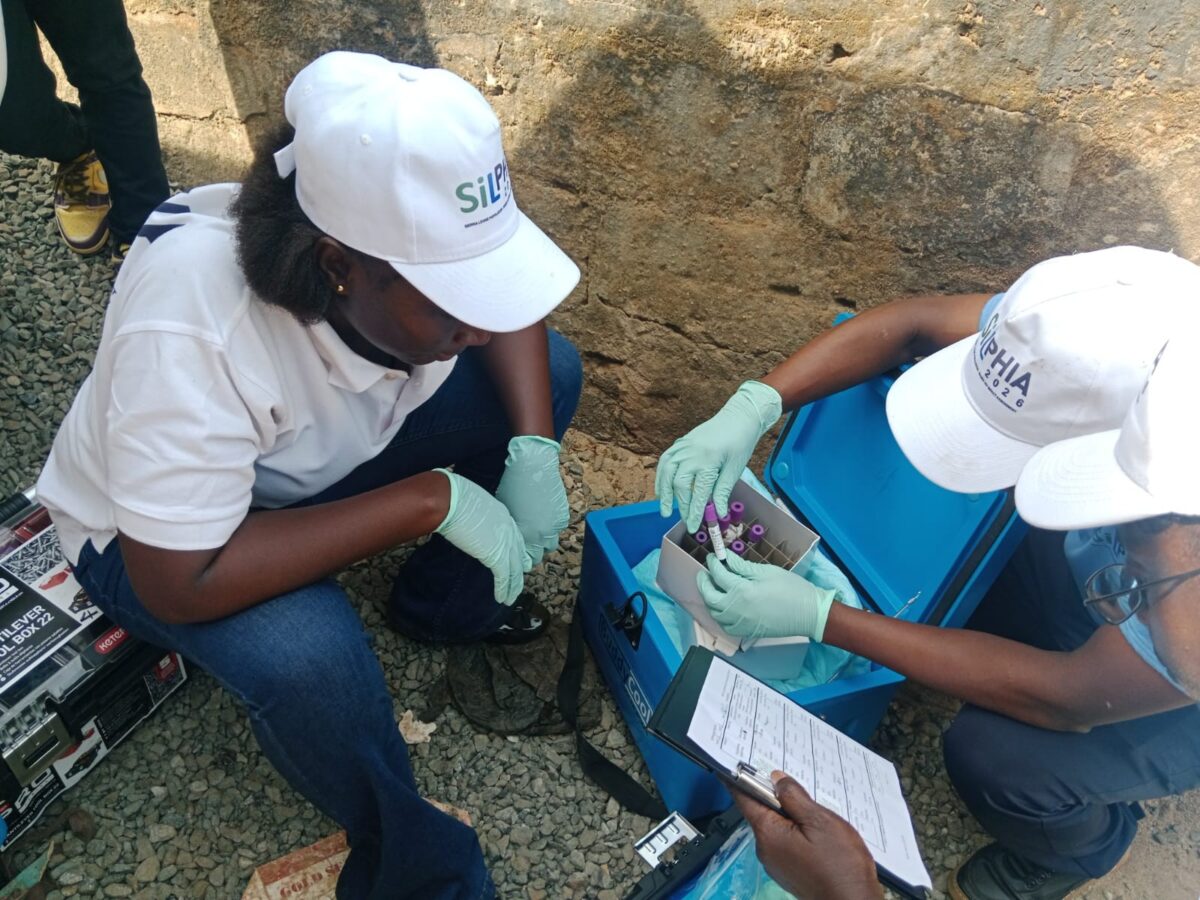Since 2020, the Almaty Model for HIV Epidemic Control (AMEC) program has supported HIV prevention, testing, treatment provision, and viral load suppression across Kazakhstan’s most populated city. Closing in July 2024, AMEC achieved remarkable outcomes, including implementation of an innovative social network testing strategy, significantly reduced HIV treatment initiation time, and improved viral load suppression via at-home HIV care.
Almaty, Kazakhstan hosts over two million residents and one-fifth of all people living with HIV in the country. Supported by the Elton John AIDS Foundation and implemented by ICAP at Columbia University, AMEC collaborated with the Ministry of Health, community-based organizations, Almaty AIDS Center, and numerous health clinics to build a cost-effective, inclusive infrastructure for HIV service delivery. The program launched a number of innovative health service delivery models focused on person-centered care.
One of those innovative models focused on the delivery of home-based HIV care. Under this Support4Health program, nurses in Almaty conducted scheduled calls and visits to patients with unsuppressed viral loads as well to pregnant women living with HIV over the course of six months. Based on this approach, 480 individuals – 86 percent of those who received these visits – achieved viral load suppression.
Another successful HIV service delivery model utilized a social network testing strategy (SNS), a peer-driven recruitment strategy, to increase HIV testing among key populations. Using this strategy, NGO staff working with individuals living with HIV asked their clients to refer people in their sexual, drug-using, or social networks for HIV testing. Based on this SNS approach, 3,163 people were tested for HIV, 93 of which were confirmed as HIV-positive. Of those who tested positive, 97 percent initiated antiretroviral treatment (ART). Compared to other outreach methods, SNS is an especially beneficial approach for bringing first-time testers into direct contact with service providers.
“The social network testing strategy approach gave us the opportunity to reach populations that were very difficult [to reach] and sometimes impossible to test and inform about HIV preventive services due to their reluctance to access medical services because of high stigma,” said Mishel, a case manager at the NGO Community Friends, which collaborates with AMEC.
“The introduction of innovative HIV testing models has made it possible to reach underserved key populations,” said Mira Sauranbayeva, AMEC project director, “including new substance users, those who have never been tested for HIV, and those who have not received services from NGOs and medical organizations.”
In addition, AMEC’s launch of an online service for ordering HIV self-testing kits, HIVTEST.KZ, was essential to helping individuals access testing. Through the platform, 3,600 HIV self-testing kits were delivered anonymously to chosen addresses and pick-up points, reaching largely young people and first-time testers.
Key to innovative HIV service delivery is partnership. Over the course of the four-year project, the Almaty AIDS Center convened multi-disciplinary teams consisting of doctors, nurses, psychologists, and peer consultants. The teams focused on particularly challenging issues, namely, patients who were taking ART for one year or more but maintained an unsuppressed viral load due to poor treatment adherence. To address the issue, teams conducted both home visits and facility-based counseling for patients, helped patients restore lost ID documents, and connected patients to an ICAP-developed chatbot that provides important health information and resources for people living with HIV. Together, they also developed new standard operating procedures establishing clear work processes and responsibilities for medical staff and NGOs involved in HIV care.
In addition to promoting HIV treatment adherence, AMEC works to ensure that patients living with HIV start ART as soon as they are diagnosed, an essential practice to suppressing one’s viral load early. Thanks to AMEC’s joint working processes between NGOs and the Almaty AIDS Center, clinical training of doctors and nurses, and incentives that reward health care workers for prompt initiation of treatment for patients diagnosed with HIV, the AMEC program reduced HIV treatment initiation time from five days in 2020 to only two days in 2024.

A nurse from a multi-disciplinary team visits a patient at his home.
HIV prevention is another area where close partnership between health facilities and NGOs led to improved outcomes. Following AMEC’s launch of pre-exposure prophylaxis (PrEP) in Almaty in April 2021, 565 people started the HIV prevention medication, including 44 percent referred by Community Friends, 18 percent by other NGOs, and 23 percent by Almaty AIDS Center staff, along with 15 percent of users who found out about PrEP on their own or through ICAP’s online HIV self-testing kit platform. AMEC also implemented a program that sends SMS reminders to clients to pick up their PrEP medication.

A client picks up a free HIV self-testing kit at an Almaty pharmacy.
Digital tools and platforms weren’t just helpful for improving client access to HIV services, but also for improving health staff’s ability to deliver them. AMEC introduced a number of e-tools, for example, that automated management of patient data.
“We introduced and implemented monitoring tools that enabled dynamic, real-time progress tracking for NGO and Almaty AIDS Center staff,” said Zhanar Tatkeyeva, monitoring and evaluation specialist for ICAP in Kazakhstan. “Using PowerBI dashboards [data visualization software] and digital journals, NGO staff can conveniently monitor performance results by employee and type of service. Additionally, AIDS Center clinicians now utilize an automated patient list generator instead of extracting multiple patient lists from several sources. This allows them to work with a unified patient list containing all necessary information.”
To showcase AMEC’s impressive outcomes and mark the end of the program, ICAP hosted a conference in Almaty in May 2024 – Effective Partnerships for Health: Joint Initiative against HIV. Over 100 partners, health officials, and other stakeholders assembled to discuss the progress, challenges and lessons learned from the program.

ICAP in Eurasia regional director Anna Deryabina (left) meets with AMEC stakeholders – including from Kazakh Scientific Center of Dermatology and Infectious Diseases, UNAIDS, the NGO Community Friends, and Almaty AIDS Center – at the May 2024 conference to discuss HIV prevention successes.
As discussed at the conference, several major cities in Kazakhstan, as well as Bishkek in Kyrgyzstan and Dushanbe in Tajikistan, are already replicating AMEC’s HIV care models in their own health facilities and communities.
“We have seen an increase in doctors’ responsibility not only towards patients but also towards their colleagues at the AIDS Center and NGO staff,” noted Bayan Jampeissova, supervising physician at the Almaty AIDS Center, speaking to the long-term impact of AMEC. “Everything I learned during the project continues to be part of my daily work.”
About ICAP
A major global health organization that has been improving public health in countries around the world for two decades, ICAP works to transform the health of populations through innovation, science, and global collaboration. Based at Columbia Mailman School of Public Health, ICAP has projects in more than 40 countries, working side-by-side with ministries of health and local governmental, non-governmental, academic, and community partners to confront some of the world’s greatest health challenges. Through evidence-informed programs, meaningful research, tailored technical assistance, effective training and education programs, and rigorous surveillance to measure and evaluate the impact of public health interventions, ICAP aims to realize a global vision of healthy people, empowered communities, and thriving societies. Online at icap.columbia.edu








